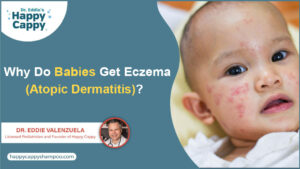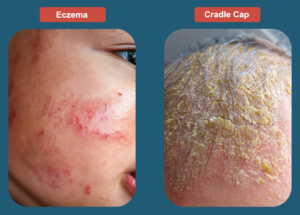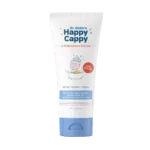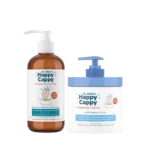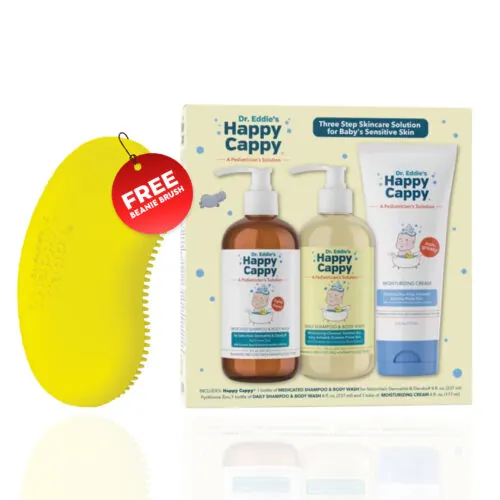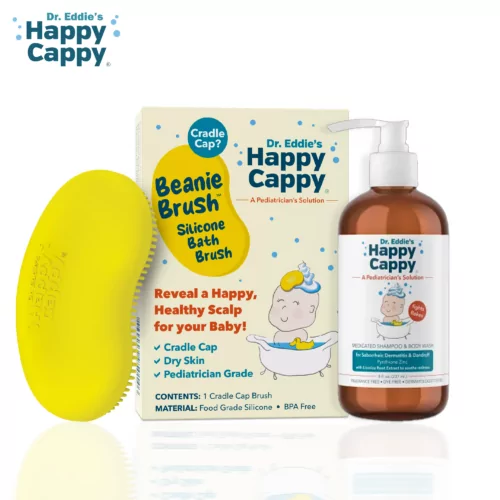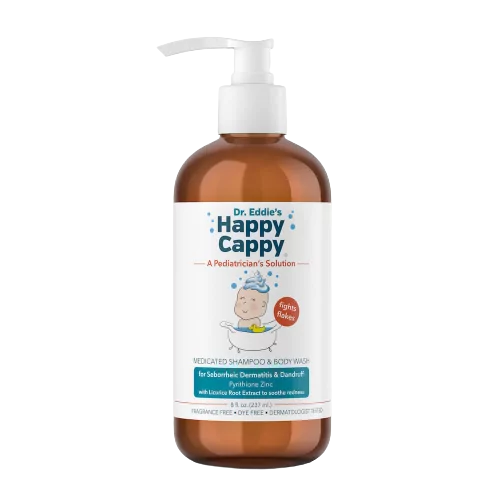Eczema is a common skin condition that causes itchy, dry, and red rashes on the skin. It is more common in babies than it is in adults. One of the most common types of eczema in babies is atopic dermatitis.
According to the American Academy of Dermatology, around 25% of children in the US experience eczema. Most of them develop it in the first year of their life. In this blog, we will help you understand why do babies get eczema and how to treat it.
What Does Baby Eczema Look Like?
Most baby eczema shows itself at around 3 months old, but onset can range from 1 to 6 months, with the latest being 2 years old. Baby eczema rashes generally form on the cheeks first but can eventually spread to the rest of the face and body.
Babies will usually experience eczema on the following body parts:
- Face
- Cheeks
- Chin
- Elbows
- Knees
- Wrists
- Ankles
- Eyelids
Some of the most common signs of eczema in babies are:
- Dry skin
- Itchy skin
- Red rashes (red or pink on lighter skin tones and purple or brown on darker skin tones)
- Small bumps
- Bumps that may ooze
- Skin discoloration
- Scaly patches of skin
What Causes Eczema in Babies?
There isn’t one exact proven cause of baby eczema. Doctors and researchers believe that it is most likely caused by a combination of both environmental triggers and genetics. Some of the most common causes are:
Genetics
Studies show that between 20% and 30% of people with eczema have a specific gene variation or genetic mutation that affects the outermost layer of the skin epidermis, making it harder for the skin to fight off irritants and retain moisture. This gene variation means that babies with a family history of eczema are more likely to develop the condition as well.
Immune System
The immune system is responsible for protecting the skin from outside bacteria, viruses, and irritants. But sometimes, the baby’s immune system becomes overactive and starts considering harmless irritants and allergens as harmful to the baby’s skin.
The immune system then releases a certain type of cells to protect the skin, and the reaction manifests as inflamed, itchy, and irritated skin.
Environmental Factors
Certain factors in the environment such as irritants and allergens can lead to eczema symptoms or an eczema flare-up. When the baby’s skin becomes allergic after coming in contact with a certain allergen such as pollen and dust mites it is known as allergic contact dermatitis the second most common type of eczema in babies.
If the baby’s skin becomes irritated by outside irritants such as chemicals in soaps and body washes then it is classified as irritant contact dermatitis. These irritants and allergens trigger the immune system and as a reaction, the skin becomes dry, itchy, and inflamed.
Skin Barrier Dysfunction
The topmost layer of the skin also known as the epidermis is responsible for protecting the skin and body against outside allergens, bacteria, and viruses and retaining moisture in the skin. If the skin barrier becomes defective either due to lack of filaggrin, immune system dysfunction, or deficiency of antimicrobial peptides, then the outside allergens are able to penetrate the skin more easily and it starts losing more moisture. This scenario leads to an eczema flare-up and eczema symptoms such as inflammation, itching, dryness, and red rashes.
What Triggers Eczema in Babies
In some cases, eczema may resolve as the baby grows old and never appears again. But in most cases, it can show up again in the form of eczema flare-ups. There are several factors that can trigger an eczema flare-up in babies such as:
- Dry skin
- Sweating
- Extreme temperature
- Fabric and clothing
- Soaps and laundry detergents
- Chemicals in skin care products
- Stress
- Allergens (pollen, pet dander, dust mites)
- Irritants
- Saliva and drool
- Food allergies
Are Baby Eczema and Atopic Dermatitis the Same?
Eczema is a broad term for skin conditions that cause itchy, scaly patches and rashes on the skin. Eczema has many types and atopic dermatitis is one of its most common types experienced by babies and adults.
Atopic dermatitis or AD is sometimes just referred to as eczema. This is the reason why often people think about whether these conditions are the same or not. Some of the other common types of eczema experienced by babies are contact dermatitis and seborrheic dermatitis also known as Cradle Cap.
Baby Eczema and Cradle Cap

Many parents confuse baby eczema with seborrheic dermatitis, often referred to as “cradle cap.” This is understandable as the two can seem similar at first glance. Even though seborrheic dermatitis is a type of eczema and looks quite similar to it. Both conditions are very different.
A few key differences between baby eczema and “cradle cap” are
- Cradle cap is less red and itchy and usually affects the scalp, eyebrows, and behind the ears while eczema causes intense itching and redness and mostly appears on the cheeks, face, elbows, and knees.
- Cradle cap is caused due to the overgrowth of Malassezia yeast and excess sebum. While eczema is caused by a combination of genetics and environmental factors.
- Cradle cap causes thick, crusty patches that look similar to a honeycomb. While eczema causes scaly patches and dry, red rashes on the skin.
Baby Eczema Treatment
There is no cure for baby eczema, but there are quite a few effective treatments that relieve symptoms. There are three main goals in treating baby eczema:
- Skincare
- Itch control
- Trigger management.
-
Skincare
Proper skin care is the most important baby eczema treatment as it can help repair and maintain a healthy skin barrier and help prevent flare-ups.
There are two key components of proper skin care for baby eczema:
-
Daily Cleansing
Every day, bathe your baby in cool or lukewarm for about 5 to 10 minutes. Cleanse their skin with an eczema shampoo and body wash instead of soaps. Make sure the eczema cleanser you are using is free from harsh chemicals and fragrances.
-
Moisturizing
After giving your baby a bath, pat dry their skin. Moisturize the skin with a baby eczema cream while the skin is a little damp. Feel free to moisturize twice a day in addition to after bath time.
-
Itchy Control
Scratching can make baby eczema worse in that it intensifies the severity of the itch. Scratching can break or further injure already inflamed skin, and can lead to infection. Help control baby eczema itch by
- Preventing your baby from scratching.
- Keep nails clipped short or put on cotton mittens.
- For intense itching consult your baby’s pediatrician for wet wrap therapy.
Managing Triggers
Managing triggers is the final component in treating baby eczema, as avoiding or managing triggers can greatly reduce flare-ups. Keep an eye on when your baby’s eczema flares up the most, or consult a doctor they will be able to rule out what might be triggering your baby’s eczema with the help of a patch test, blood tests, and extremely rarely–a skin biopsy.
Alleviating Baby Eczema Flare-ups
One of the most common triggers for baby eczema is soap. Most soaps and shampoos available on the market have a pH of 9 to 10, meaning that they can negatively alter the pH of the skin. Since studies have shown that maintaining a normal skin pH (between 4 and 6) can go a long way toward relieving eczema flare-ups, it is vital to use a gentle cleanser with a low pH.
Dr. Eddie’s Happy Cappy Daily Shampoo and Body Wash is an eczema shampoo for babies that complies with pediatric dermatologist recommendations for eczema by being a non-soap cleanser that is hypoallergenic, fragrance-free, and that has a low pH. Made with over 95% natural, plant-based ingredients like oatmeal, aloe vera, licorice root, apple fruit, hyaluronic acid, and glycerin. This moisturizing, non-soap cleanser is gentle enough for daily use on sensitive young skin and is considered one of the best baby washes for eczema.
Use Happy Cappy Daily Shampoo and Body Wash as a daily shampoo for eczema to soothe your baby’s skin. For best results moisturize your baby’s skin after washing with Happy Cappy Moisturizing Cream for Eczema to restore the skin’s natural barrier and keep it hydrated all day long.
Key Points
- Eczema is a common skin condition in babies that affects about 25% of children in the US in the first year of their life.
- Eczema is not contagious.
- Eczema causes inflammation. Inflamed skin becomes itchy, dry, and red.
- There is no permanent cure for eczema but eczema symptoms can be alleviated by taking proper care of the skin.
- Incorporate the use of an eczema cleanser to bathe your baby daily and make sure to moisturize their skin with a baby eczema cream after the bath and twice daily.
FAQs
Can I treat my baby’s eczema naturally?
There are a lot of natural remedies on the internet that guarantee alleviating a baby’s eczema. But it is best to stay away from those natural remedies as every baby is different, and so is their skin. Their delicate skin may react negatively to a remedy and worsen the condition.
What things to avoid when a baby is having eczema?
Certain things may make your baby’s eczema worse, so it's essential to avoid them, such as keeping your baby’s nails trimmed so they don’t scratch and using mild shampoo and body wash rather than using products with harsh chemicals. If you know a specific allergen is causing your baby’s eczema, avoid it.
Can eczema be painful for babies?
Eczema can become painful for babies if it’s not managed correctly and on time. Severe eczema can cause small blisters that may ooze. These can be very painful for the baby. It is best to consult the doctor when you suspect your baby has eczema.
Can breast milk worsen a baby’s eczema?
Meanwhile, breast milk may not directly cause or trigger eczema. But if your baby is experiencing eczema due to any food allergy and you are eating that, then this can worsen the baby’s eczema.
Which cream is good for my baby’s eczema?
An eczema cream specially formulated for babies, clinically tested, non-greasy, paraben-free, sulfate-free, and fragrance-free is best. Happy Cappy Eczema Moisturizing Cream is an excellent option, as Dr. Eddie specially formulated it for babies with eczema-prone skin.

